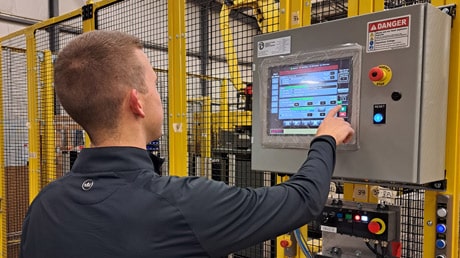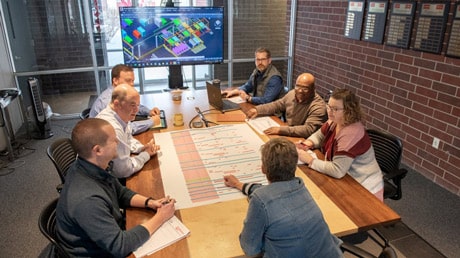
Now more than ever, warehouses and manufacturing facilities rely on efficient, dependable systems to remain competitive. With the help of a skilled systems integrator, you’ll be able to streamline your operations, boost productivity and improve safety. While this provides a huge advantage now, it also better positions you for growth in the future.
Learn more about what systems integration is, how it can benefit your business and how to select the right partner for your material handling automation project.
What Is System Integration?
System integration involves automating your facility’s processes to create more efficient operations. This process involves automating operations by integrating different types of material handling equipment, such as:
- Conveyor systems
- Order picking
- End-of-line packaging systems
- Industrial robotics
- Overhead cranes
- Industrial scales
- Automated vehicles and carts
It can also involve implementing hardware, software, sensors and other devices that track inventory, optimize storage, manage business processes and monitor and control equipment. Together, these different parts created one seamless integrated system.
Why System Integration Is Important – 7 Key Benefits
1. Alleviates Ongoing Labor Shortages
Labor shortages continue to be a persistent issue for manufacturers, especially as more Baby Boomers retire and younger workers pursue careers in other industries. In their 2021 manufacturing outlook, Deloitte and The Manufacturing Institute now project the skills gap will leave the sector with 2.1 million unfilled positions by 2030, potentially costing the U.S. economy $1 trillion.
Automated systems can handle roles people don’t want to do, especially ones that are repetitive and potentially dangerous due to heavy lifting. They also allow employers to put their human employees to better use, which helps reduce turnover and associated costs.
2. Increased Efficiency
Unlike human workers, automated systems don’t need breaks and can work 24/7, if your operations call for it and your lines allow it. This helps businesses optimize their workflows and streamline their processes. And, with the help of real-time monitoring, potential issues can be caught earlier to prevent downtown.
3. Improved Product Quality
Automation, particularly industrial robotics, rewards you with consistency each and every time. This means less shaking, less jarring and less damage to products. With the help of an experienced industrial robot integrator, your system can perform tasks with precision and consistency, reducing the risk of human error. When you add sensors and cameras, you’re able to monitor product quality and potential defects in real-time and immediately correct the problem.

4. Better Decision Making
Systems integration empowers businesses to make informed decisions through real-time data and analytics. Some of these insights may include identifying trends, optimizing resource allocation and improving efficiency and productivity
5. More Flexibility
System integration helps businesses be more flexible and adapt to changing market demands and production requirements. This is especially helpful if your business has seasonal rushes. Automation can quickly adapt to new products and higher or lower production volumes, while real-time data and analytics can identify bottlenecks and optimize production schedules to meet changing customer needs.
6. Improved Safety
Many misperceptions exist about manufacturing jobs, particularly that they’re dirty, dull and dangerous. While some tasks that involve lifting, bending or twisting can put some workers at higher risk of injury, automated systems can easily handle these needs.
7. Better Customer Satisfaction
When your operations are streamlined and your products are of higher quality, your customers are happy too! Automating your workflows can accelerate production processes, meaning you can fulfill orders more quickly, with shorter delivery times.
What Is a System Integrator and What Do They Do?
In the context of manufacturing, warehousing and distribution, a systems integrator is a specialized professional who bridges the gap between automated processes, control systems and broader, day-to-day operations.

They can help you think through projects that involve:
- Solving workflow problems affecting productivity and profitability, such as bottlenecks during production, unreliable equipment that causes excessive downtime or back-ups in the shipping process
- Optimizing space at your existing facility when expansion isn’t an option
- Upgrading existing lines to include automated equipment
- Integrating automation with new lines
- Expanding your facility or moving to a new location as your business grows
Some of the things a systems integrator company, its engineers and its maintenance team do include:
- Designing and planning – assessing a client’s needs, designing the system and planning the implementation process.
- Procurement and integration – coordinating with vendors to secure the necessary equipment, software and hardware.
- Installation and configuration – installing, configuring and testing the new system.
- Maintenance and support – ongoing maintenance, troubleshooting and support to ensure reliability and performance.
How to Choose the Right System Integrator
Choosing the right automation system integrator is critical for your project to be successful. RMH Systems offer a unique advantage–one expert team under one roof. You’ll also have access to our full suite of industrial solutions, including material handling, packaging, robotics, cranes, engineering services and maintenance. Our industry experts are here to solve your greatest needs, so don’t hesitate to contact us to schedule your free engineering consultation today!